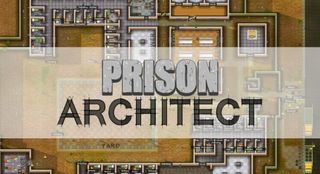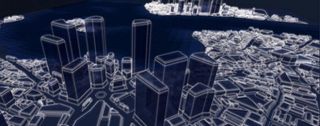Introversion's Chris Delay on shifting from Subversion to Prison Architect: "I wanted to build Alcatraz"

One week ago, Introversion dramatically announced that they have shifted development away from their procedural bank-heist sim, Subversion to work a completely new game for submission to the Independent Games Festival. Their new game is called Prison Architect . It lets players construct and maintain high security prisons. We got in touch with Introversion's Chris Delay to find out why the team decided to put Subversion on hold, how they made the decision to drop a game that they've been working on for years, and what inspired them to make Prison Architect instead.
PC Gamer: From what we saw on the outside, Subversion looked ambitious, fresh and exciting, with some fantastic tech behind it. Why did you decide to put the project on indefinite hiatus?
Chris Delay: It certainly was all those things, but we struggled to find a really solid “core game” within the tech that we'd developed. We did what no game designer should do – we had more fun making the game tech than players would ever have playing it. There has to be some action at the core of a game, that is typically repeated thousands of times, that is simply fun and rewarding to do again and again. Everything else is theme and setting, which are also crucial, but they have to be built on the foundations of a core game. We worked on Subversion for so long that we struggled to remember what the game was supposed to be about. Eventually we realised there simply wasn't a core game, and no amount of technology or polish would solve that.
PC Gamer: Will Introversion eventually return to try and finish Subversion, or is it more likely that it'll become an important lesson, but never materialise as a full release?
Chris Delay: The way we think about it, Subversion has become fertile ground for our future projects. We've had several ideas that are based on Subversion already, Prison Architect is just one of them. Certainly the game we've talked about in our blog will never be released – if we do go back to Subversion we will be making some fundamental changes. We wouldn't go back to it now unless we felt we could reach the core game very quickly indeed – we are done with years of open ended tech development.
PC Gamer: What lessons have you learned from your work on Subversion that you'll carry through to work on Prison Architect and future projects?
Chris Delay: Probably the biggest lesson is to get to the core game as quickly as possible, whatever the cost. With Subversion we had this idea that if we just developed an incredible simulation of a procedurally generated world, that a game would emerge from it. We thought it would be enough to have a massively interactive world – just think of the possibilities! So we just kept throwing more tech at the problem, developing newer and more complex simulations, hoping an emergent game would be waiting for us at the end. We should have seen the danger signs with that earlier I think.
The biggest gaming news, reviews and hardware deals
Keep up to date with the most important stories and the best deals, as picked by the PC Gamer team.
PC Gamer: In the post announcing the shift from Subversion to Prison Architect, you mentioned that you "could see how much of the tech that we'd designed for Subversion was directly applicable." Can you talk about any themes or technology that will be making the jump from Subversion into Prison Architect?
Chris Delay: There was an unfinished mission in Subversion where you had to bust a team member out from a maximum security prison. This mission had loads of specialist code for simulating the inner workings of prisons, and the behaviours of guards and prisoners. It was far too ambitious for its own good, much like most of Subversion. The core idea had been to simulate a prison in a lot of detail, then just let the player figure out how to bust his teammate out by exploiting whatever loopholes in the security setup he could find. It's a nice idea in principle, but in reality that kind of unbounded thinking is what ended Subversion. After all the work required to do a prison properly, most players would probably just blow a hole in the wall with explosives and headshot the guards anyway.
However we did have a map editor for Subversion, and I'd been working on producing a plausible prison layout for the mission. And I'd found that laying out that map was actually quite a lot of fun. I spent a lot longer tinkering with my prison layout than playing the mission.

PC Gamer: You mentioned in your announcement that the idea for Prison Architect sprung almost fully formed into your brain. Where did that idea come from?
Chris Delay: I was actually on holiday in San Francisco with my wife, and I'd been thinking quite a lot about Subversion and what was going wrong with it. I was toying with various radical rethinks of the core idea, trying to find something that was interesting. Three things then happened : we took a tour around Alcatraz, which was absolutely amazing because it's such an atmospheric place to visit. I then made a connection to the prison mission in Subversion, but imagined turning the whole thing on its head – let the player build the prison and setup the security. In other words, I wanted to build Alcatraz, not escape from it. The core of the game was set down right there, before I even got off the boat and back onto land! Then the third thing is that I was thinking quite a lot about this new idea in the taxi home from the airport, and the taxi driver turned out to be an ex-prison guard in one of Her Majesty's Prisons in the UK. So I spent about two hours taking notes from this guy about all the things that had happened to him, and all the things he'd seen over the years. And I could just see gameplay in virtually everything he said about how jails worked.
PC Gamer: How did everyone react when you returned from holiday with a whole new game idea?
Chris Delay: My wife spent quite a while trying to talk me out of it actually. I was telling her that I was thinking about dropping Subversion altogether, and switching onto a new idea that I'd had literally that morning. It had to be done though, to be honest I'd been looking for a way out of Subversion for a few months before the idea for Prison Architect came forward. I'd been trying to find ways to cut it down to the bare essentials, or release it somehow in a very early state, but basically they were all attempts to get out of having to finish it, because I couldn't really see how to.
I actually planned how to present the news to the other guys at Introversion quite carefully, because I knew it could go down very badly indeed. They'd been waiting for me to “get it together” with Subversion for years as well. In the end I actually gave a powerpoint presentation on the new idea, and the need for us to change to it! I had my core messages very clearly thought out, because I really did think this could be a company ending moment if I delivered it wrongly! In the end it wasn't that tough to sell the idea to them, because I think they could see the potential in the new idea straight away as well, and they also shared my worries about Subversion going off the rails forever. So from that first meeting we agreed to put subversion on hold and do a six week “first playable” of Prison Architect, and by the end of that period we already had more of a game than Subversion had ever been.
PC Gamer: You mentioned scribbling the design brief onto a notepad on the flight home, and how that reminded you of working on Uplink. And Prison Architect will be the first game you've submitted to the IGF since Darwinia. Does the new project feel like a symbolic return to Introversion's roots? A new beginning?
Chris Delay: Certainly the hand written notepad feels like a return to Introversion's roots – its exactly how Uplink started its life, in a notebook I carried around at university. It's difficult to say though, Introversion is definitely a different company now than it was then, not least because we are all different people now. But there's something very satisfying about having a core game documented in ten hand written pages or so, that remain the principle guide to the game even now.

PC Gamer: Does spending six years on one project rob it of some of its freshness? Is it more exciting to be working on something new for the first time in a while?
Chris Delay: Although Subversion has been in development for that long, you have to remember that we've shipped Defcon, Multiwinia and Darwinia+ in that time, as well as a couple of unreleased projects like Chronometer! So Subversion has always been a background project, until about 2 years ago I think. Subversion was always the exciting new project, and never really got boring because we were always developing such cool stuff, and we were picking up great feedback from the press and our fans about what we were doing. It was only once we started work on it fulltime, and we never seemed to be able to reach a point where you could play a mission, that we realised we had some problems.
PC Gamer: You guys have been through a lot. How do you think Introversion has changed in over the years?
Chris Delay: Yeah we have been through a lot, and it feels like we've been doing this for a long time now. Uplink feels like a different era altogether, closer to University for me than Introversion. Each person at Introversion sees our history slightly differently. I think we had our most incredible years when we were doing Darwinia and then Defcon straight after – both games we are hugely proud of. We also took the IGF prize around the same time in 2006, and did the Steam deal, which continues to be our best business partnership to this day. I mean, we just love Valve to bits! How often does one company make so many of your favourite games AND provide you with the best storefront for your own work? Once Defcon was done we started expanding, and I feel like we fell off the boil quite seriously, pursuing a console version of Darwinia which shipped in 2010, way later than planned. Multiwinia was part of that project (being the multiplayer component to Darwinia that Microsoft required for their console), and that also fell a little flat, I think it's our weakest game, although I'm still very happy with it, and disappointed more people didn't play it in the end. During this time we scaled up to ten fulltime staff in a London office and a handful of freelancers, so it was getting pretty big for a while.
But now all that is over, we are back to the original three founders and some highly talented freelancers, all working out of our bedrooms once again (Myself and Mark both work in bedrooms now, that isn't a lie) and it feels like the old Introversion again. Our core mission now is to make the next original game, and that was our intention when we started out in 2001, and I think that's a very healthy mission for an indie game developer. For a while during 2008 and 2009 I don't think you could say that was our core mission, so it feels good to be back.
Part of the UK team, Tom was with PC Gamer at the very beginning of the website's launch—first as a news writer, and then as online editor until his departure in 2020. His specialties are strategy games, action RPGs, hack ‘n slash games, digital card games… basically anything that he can fit on a hard drive. His final boss form is Deckard Cain.
Most Popular




